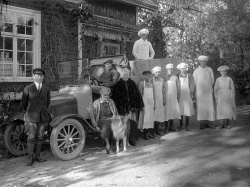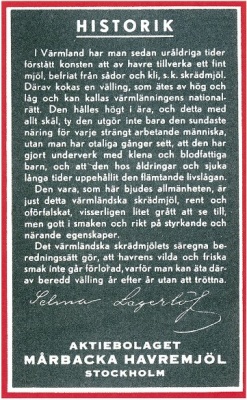Oats Force
01. Feb. 2009

Selma Lagerlöf and her staff at the end of the 1920’s. Photo: The Mårbacka Foundation
A flair for business was in her blood. Her grandfather Carl Johan Wahlröth had been a successful businessman. Her father, however, had unfortunately not been blessed with the same talent and his running of Mårbacka ended with a forced sale of the estate.
In 1882, when Selma Lagerlöf with borrowed money and against her father's will began at the Royal Teachers' Training College i 1882, the determined young woman announced: "I shall be able to earn my own living and answer for my actions; it shall be up to myself to obtain my goals and my willpower shall be strong". These were not empty words. In 1891, she made her debut as a novelist with "Gösta Berling's Saga". Only four years later she resigned as a teacher in order to devote herself to the pen. With the profits from the sales of her books "Jerusalem" (1901) and "Nils Holgersson's Wonderful Journey through Sweden" (1906-1907) she started to repurchase her childhood home. First the main building and later also the lands belonging to the estate when she received with the Nobel Prize the amount of 139,799.83 Swedish kroner, equal to about. 6 million Swedish kroner today.
Besides farming she ran Mårbacka Oatsmeal exporting large consignments of oats flour to among others the US. She produced about 10 tons per month; a production which is three times larger than the production today at Stöpafors Mill, the world's only remaining producer of oatsmeal - or skrädmjöl as it is called in Värmland.

Advertisement for Oatmeal.
Selma Lagerlöf committed herself to design and marketing of her products. In accordance with the leading advertising principles of that time there was a small story about the product on the back of the oatsmeal packages, signed by the famous author herself. For the packaging and advertisements for Mårbacka Oats Force she even made up a rhyming slogan like "Oatsmeal - with appeal". Moreover, Lagerlöf developed recipes for dishes in which the main ingredient was - yes, you have got it - oatsmeal.
But despite modern marketing and a large production Mårbacka Oats Flour was never a profitable business. The economic crisis of the 1930's was also perceptible at Mårbacka, and Selma Lagerlöf might have had a tendency towards being too generous to her employees. Under all circumstances rumours have it that the large farmers in the area felt a pressure from Lagerlöf's higher wages to the farm hands and girls at Mårbacka and consequently asked her to lower the wages. Instead, their inquiry resulted in a pay increase. It is said that Lagerlöf showed an interest in every single member of her staff; e.g. she effected a health insurance to help her staff in case their health failed.
Although Mårbacka oat flour is still being sold from the Mårbacka Foundation, it is no longer a brand of any economical impact. On the other hand, Selma Lagerlöf's name is still of considerable importance to Mårbacka, to Sunne Municipality, and to the entire Värmland county with a view to attracting tourists.
See the special exhibition "Spellbound - The Readers' Selma Lagerlöf" at Post & Tele Museum until 10th May 2009.
This article may be copied or quoted with MuseumsPosten, Post & Tele Museum as source.
Comment this article
Only serious and factual comments will be published.